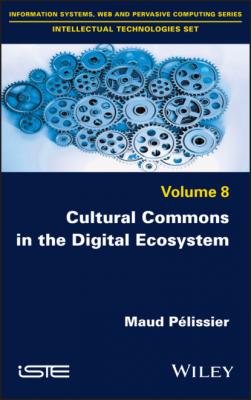Cultural Commons in the Digital Ecosystem. Maud Pelissier
Чтение книги онлайн.
Читать онлайн книгу Cultural Commons in the Digital Ecosystem - Maud Pelissier страница 4
 175
175
177 176
178 177
179 178
180 179
181 180
182 181
183 182
184 183
185 184
186 185
187 186
188 187
189 188
190 189
191 190
192 191
193 193
194 194
195 195
196 196
197 197
198 198
199 199
200 200
201 201
202 202
203 203
204 204
205 205
206 207
207 208
208 209
209 211
210 212
211 213
212 214
213 215
214 216
215 217
216 218
217 219
218 220
219 221
220 222
Intellectual Technologies Set
coordinated by
Jean-Max Noyer and Maryse Carmès
Volume 8
Cultural Commons in the Digital Ecosystem
Maud Pélissier
First published 2021 in Great Britain and the United States by ISTE Ltd and John Wiley & Sons, Inc.
Apart from any fair dealing for the purposes of research or private study, or criticism or review, as permitted under the Copyright, Designs and Patents Act 1988, this publication may only be reproduced, stored or transmitted, in any form or by any means, with the prior permission in writing of the publishers, or in the case of reprographic reproduction in accordance with the terms and licenses issued by the CLA. Enquiries concerning reproduction outside these terms should be sent to the publishers at the undermentioned address:
ISTE Ltd
27-37 St George’s Road
London SW19 4EU
UK
John Wiley & Sons, Inc.
111 River Street
Hoboken, NJ 07030
USA
© ISTE Ltd 2021
The rights of Maud Pélissier to be identified as the author of this work have been asserted by her in accordance with the Copyright, Designs and Patents Act 1988.
Library of Congress Control Number: 2021934586
British Library Cataloguing-in-Publication Data
A CIP record for this book is available from the British Library
ISBN 978-1-78630-637-1
Introduction
At the dawn of the 21st century, after having long symbolized the inefficiency of shared property, the commons have reappeared in force as an effective principle of social and cultural struggle against the current dynamics of capitalism. It has imposed itself as the banner of various social movements rising up in the four corners of the world against the extension of private property to all spheres of living together. It is at the heart of the anti-globalization movement, where the activist Naomi Klein, at the Porto Alegre Social Forum in 2001 in a famous text, “Reclaiming the Commons”, protested against the privatization of all aspects of life and the transformation of all activity and value into merchandise (natural resources such as education and health). It is regularly found mobilized in environmental movements campaigning for the protection of natural “commons” and the prohibition of access to certain natural resources. The commons are also at the heart of actions to remunicipalize water in certain Italian cities, where the category of common good has been legally recognized alongside that of public property. It thus designates certain categories of resources that must be placed outside the market, managed by a public subject with the participation of citizens. As Pierre Dardot and Christian Laval rightly point out, by uniting disparate forces, the common has gradually become the central category of contemporary anti-capitalism through a resumption of the critique of private property as an absolute condition of social wealth: “What gives meaning to the meeting of these different aspects of the commons in a single designation, is the demand for a new form of ‘community’ and democratic management